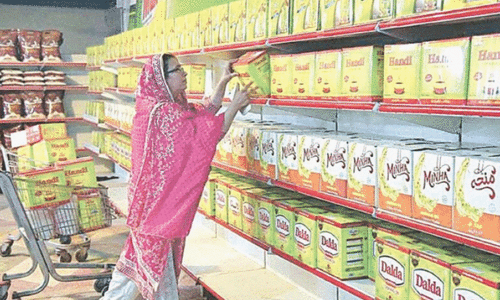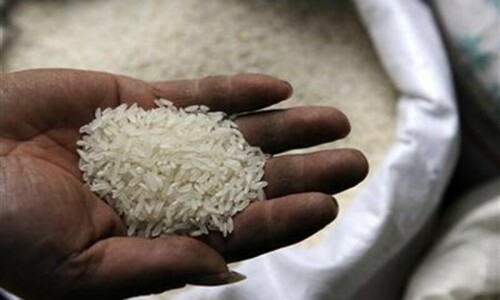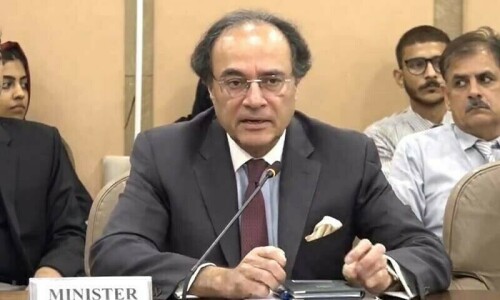 The State Bank of Pakistan’s warning on the growing challenges to the economy was followed by the slide of the rupee in the inter-bank.
The State Bank of Pakistan’s warning on the growing challenges to the economy was followed by the slide of the rupee in the inter-bank.
In its quarterly report of fiscal 2008 released on Saturday, January 5, the SBP predicted in no uncertain terms the annual current account deficit going up to 5.2 per cent by end June as against 4.9 per cent in the last fiscal year. And from the following Monday, the rupee came under strain and by Thursday noon was quoted in inter-bank market at Rs62.75 a dollar.
The July-October current account imbalance at $3 billion is better than $3.5 billion deficit in the same period of 2006-07, but things went wrong from the second quarter, particularly from November when politics and expediency overtook all economic considerations. Deterioration set in and the chain of events that followed November 3 emergency exposed the national economy to increasing risks.
Market analysts now predict that rupee-dollar parity may go down further by the end of next June. But some exporters want a dollar at Rs70 to boost their foreign sales, no matter how it will impact the import bill and inflation. ‘’Caretakers will avoid taking such a decision but the elected government will have a tough time to draw up a strategy’’, remarked an economist. The central bank believes in a market-driven exchange rate, intervening only in case of abnormal volatility.
‘The rupee depreciated by 1.4 per cent between July and December 12 as the deterioration set in the external sector in November/December. The SBP report informs that the rupee value depreciation was limited to 0.5 per cent in July-October 07.
Between July and October, 07 the financial and capital account showed a surplus of $3.1 billion and raised the foreign reserves to $16.4 billion. But the subsequent developments between November/December reduced the reserves to $15.5 billion. Financial analysts say there was no respite from the process of haemorrhage of the foreign exchange reserves.
Dollars’ outflow has overtaken dollars inflow’’, said an analyst in a money exchange company while trying to explain the slow erosion of rupee value, adding that, ‘the demand for dollars from importers and oil companies in the inter bank is mounting with every passing day’’. He sees little possibility of any respite as international oil prices are giving no indications of a reversal and merchants are set to import wheat at $450-500 a ton along with many other consumer items.
On the other hand, the inflow of dollars is slowing down. The export growth is too sluggish. The remittances may come under strain after November 3 emergency and following the devastating incidents that shook the country. The latest was the incident on last Thursday of a bomb blast that shattered investors’ confidence and market watchers now fear a big haemorrhage of portfolio investment. An official justification, issued by the federal finance ministry for imposition of emergency, apparently failed to provide comfort to investors.
And yet, Asad Saeed, a noted economist, is confident that the rupee exchange value will not tumble down. He also rules out a huge devaluation of the rupee to boost exports as it would raise the import bill and push the inflation to un-manageable limits. However he wants a hard look at the budget and economic policies. If the monetary policy is to be retained, the fiscal policy needs to be reviewed, he maintains.
But on the other hand, a retired central banker foresees bad days ahead: ‘’I have been warning for the last few years about the growing imbalances,’’ he says, as according to him, a prudent policy-fiscal and monetary-should bring about a balance within four to five years. ‘He estimates the trade imbalances for 2007-08 at around $15-16 billion by end-June next and the current account deficit at around $7-8 billion Foreign borrowing is becoming too expensive.
The government has already borrowed Rs191 billion from the banking sector which is Rs35 billion more than the target and further borrowing will create more reserve money pushing up inflation, he added..
He says that foreign investment came mostly in services sector which, in turn, outgrew the real commodity sectors. It does not provide commodities but it creates demand for the same. ‘’No wonder, 56 per cent of our import bill —directly or indirectly---is for consumer goods’’, he said while including mobile phones in the same category.
The SBP report identifies two potential factors that could impact on the economy. The first is the decrease in export growth and the second being the rise in cost of financing for funding external deficit.
‘’Our exports are expensive and too meagre in quantity as compared to our competitors-- India, China, Bangladesh and other countries’’, the retired central banker said. ‘’Mere cosmetic measures will not improve the export performance but a whole revamping of industry and agriculture will have to be done,’’ he says. There has to be long-term policies with periodical reviews.
The SBP report also reminds its readers that domestic economy is now more prone to external shocks than ever before. ‘’This has important policy implications going forward’’, the report says while pointing out that domestic prices will be more sensitive to international prices even in face of surplus availability. The report does not elaborate much but businessmen mention wheat as an example. Farmers produced 23.3 million tons of wheat against the requirement of 22 millions. The growers were paid only Rs425 for 40 kg as against almost three times of this price in the international market. Even now, wheat in Karachi is selling for Rs22 a kg while in Lahore, it is Rs19 a kg.













































Dear visitor, the comments section is undergoing an overhaul and will return soon.